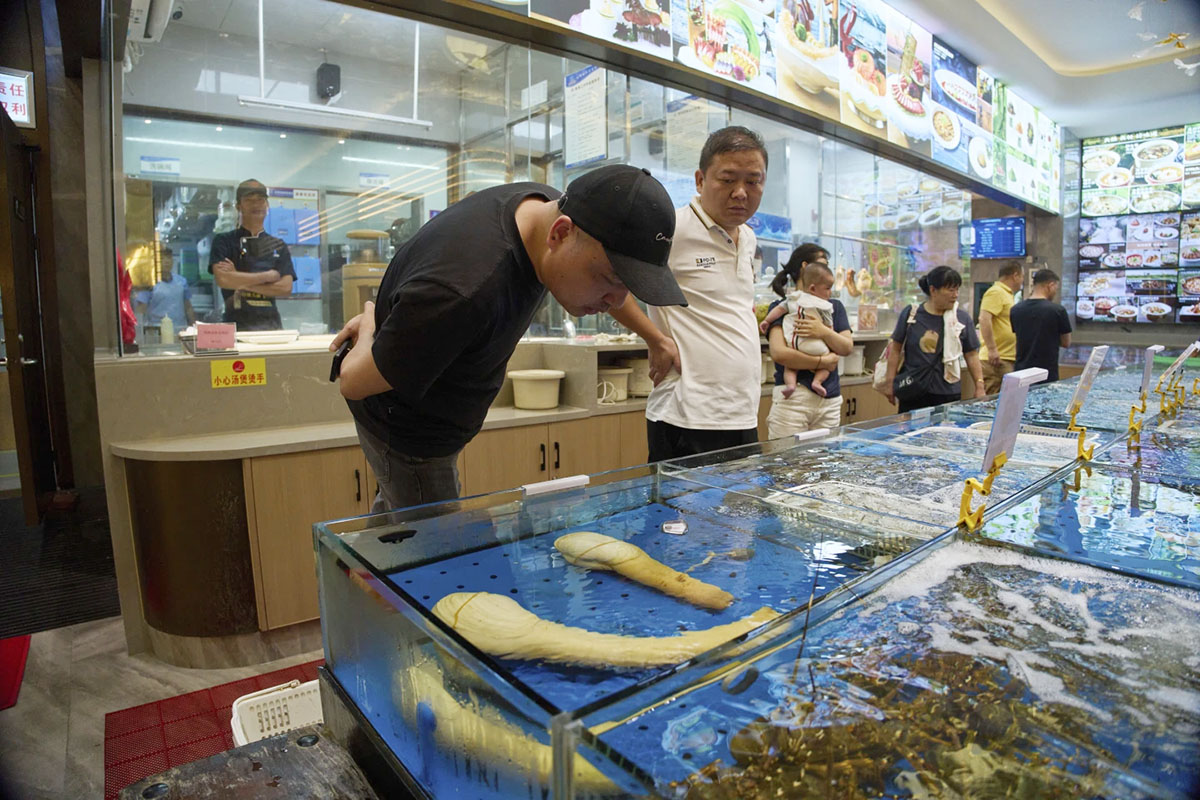
For over two decades, Suquamish tribal member Joshua George has been diving into the emerald waters of the Salish Sea, searching for geoducks—a unique clam highly prized thousands of miles away.
George is a geoduck diver. The world's largest burrowing clam, pronounced "gooey-duck," has been harvested in tidelands by George's Indigenous ancestors in the Pacific Northwest long before the arrival of European settlers.
In recent years, geoducks have become a delicacy in China, with Washington state supplying 90% of its harvest to Chinese consumers. However, the escalating trade war between the United States and China is severely disrupting the industry, leaving divers unemployed, exporters without business, and Chinese buyers with fewer shipments of the highly sought-after clam.
"It's the first time in 24 years where I don't know when or if we'll be going back to work or if I have to find another job or what we're going to do," George said.
The economic feud between the United States and China intensified rapidly after US President Donald Trump resumed tariff actions following his re-election. By April, the US had imposed at least 145% tariffs on Chinese goods, prompting China to retaliate with 125% tariffs on American imports.
Senior US officials are set to meet with Chinese representatives in Switzerland this weekend for their first major trade discussions since the latest tariffs were imposed. However, the outcome remains uncertain.
Geoduck industry at risk
Weighing about two pounds, the geoduck is deeply embedded in regional culture, even serving as the mascot for Evergreen State College in Olympia. The meaty mollusk, described as sweet and briny, is often eaten raw as crisp sashimi in the Pacific Northwest, while Chinese consumers prefer it chewy in stir-fries or hot pot soups. Before the trade tariffs, restaurant prices for geoduck reached $100 per pound, making it a dish typically reserved for special occasions such as Chinese New Year or corporate events.
Unlike other seafood products that can be stored long-term, geoducks must be shipped live on the day of harvest. The tariffs had an immediate impact, forcing the industry to halt exports.
"The whole market, everybody just had to stop," said Jim Boure, general manager of Suquamish Seafoods, an enterprise run by the Suquamish Tribe. "We started getting phone calls from buyers saying orders are cancelled."
Harvest numbers plummet
The millions of pounds of geoducks shipped annually to China come from two primary sources—wild harvests overseen by the Washington State Department of Natural Resources and Puget Sound Treaty Indian Tribes, and tideland farms operated by private businesses. The state auctions its share to exporters who often contract divers to harvest them.
By late April, divers in Washington state had pulled only half of the expected harvest from designated tracts, according to Blain Reeves, an aquatic resources division manager at the Department of Natural Resources. Last year, the state and tribes collectively harvested 3.4 million pounds of wild geoducks for sale. The state generated $22.4 million in revenue from its share, funding local aquatic restoration projects. The private farm harvest remains untracked.
"If only half the pounds that were contracted are harvested, then our revenue is halved," Reeves said.
-1746693232.jpg)
-1746693232.jpg)
Despite the slowdown, the Suquamish operation must continue its maintenance efforts to remain ready for future business should China resume imports.
On a recent April day, George's team made a quick trip to collect a sample of geoducks for state lab testing.
"When we're doing the job, and it's not all this other political stuff behind the scenes and everything else, we love this," said George, adding that early-morning diving ensures the geoducks are shipped out by evening.
Fellow diver Kyle Purser voiced concern over the industry's uncertain future.
"When you're watching your money disappear and you've got families to feed and not knowing when you're going to get your next paycheck, it's very stressful," he said.
Canada gains an advantage
Even before tariffs took effect, the Chinese economy was struggling to regain post-pandemic momentum, reducing demand for imported geoducks. Washington state's losses have inadvertently benefited Canada's geoduck industry, which faces only a 25% Chinese tariff compared to the 125% imposed on US exports.
Washington state and British Columbia are the two main regions where wild geoducks grow naturally for commercial harvest. The two countries had cooperated in seafood exports to China for decades, given the labour-intensive and highly regulated nature of geoduck harvesting, which requires divers to dig deep beneath the seabed.
"They love the fact that it tastes like the sea," said James Austin, president of Canada's Underwater Harvesters Association. "It's a product that's really a hit with the Chinese. It's all about the wild coastline. It's really prestigious."
Austin predicts that Canada will harvest 2.75 million pounds of geoducks in 2025, generating approximately CA$60 million (US$43.4 million) in revenue.
China's reduced supply from the US has strengthened Canada's negotiating position, allowing for price increases. For example, after Canada's 25% tariff took effect in March, the export price fell to $12 per pound. However, following Washington state's 125% tariff in April, Canadian geoducks are now selling for $17 per pound.
"We have no competitors right now," Austin said.
At Beihai Huaxiashougang Health Industry Company in Beihai city, Guangxi province, seafood importer Yang Bin confirmed they had completely stopped sourcing geoducks from the US.
"We don’t care about US tariffs because we can get geoduck from other countries with stable prices," Yang said.
Uncertain future
After the trade standstill, Washington state divers cautiously resumed work in April, harvesting 800 pounds of wild geoducks in a single day.
Diver Derrick McRae, working in an inland sea channel west of Seattle, described how he carefully dug up geoducks using a water spray gun to move sand, feeling for the clam's neck before pulling it up and placing it in his net.
"We're just kind of waiting on the edge of our seats to see what happens next," McRae said.
At a southern inlet, geoduck farmer Ian Child expressed concern about how the tariffs were affecting his business. He typically plants young geoducks in summer, but he cannot mix new crops with unharvested clams.
"I think the demand is still over there for the product," he said. "I think they still want it. It's just a matter of where the tariffs will land."
By RSS/AP





